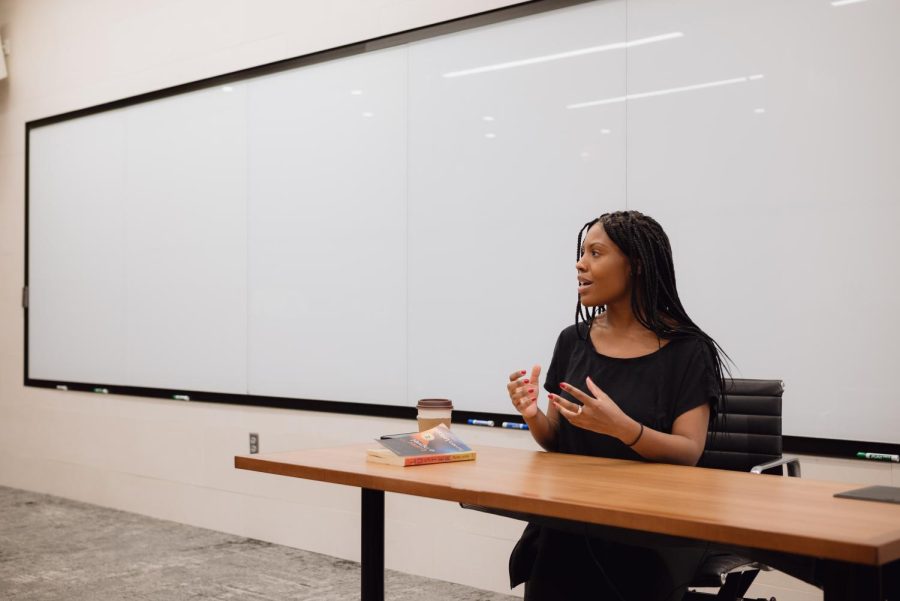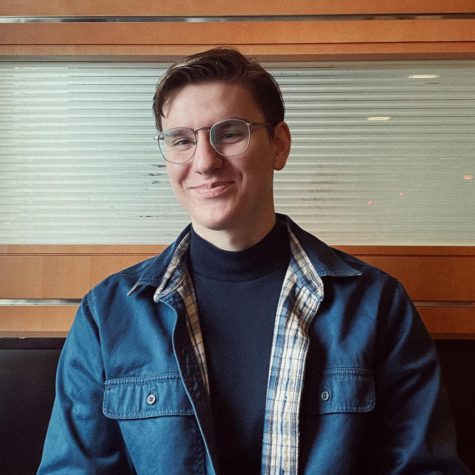Writers@Grinnell welcomes Distinguished Author Raven Leilani
W@G Distinguished Author Raven Leilani speaks at the roundtable discussion about her novel “Luster.”
April 24, 2023
Raven Leilani writes with fervor, her sentences cascading sometimes for entire pages broken up only by commas, allowing her prose to transcendentally capture the subconscious of a Black woman trying to maintain her sanity while also trying to survive and make sense of a world ruled by unjust systems of oppression. Her masterful 2020 debut novel “Luster” garnered critical acclaim, with the book winning a multitude of awards as well as glowing praise from authors and publications spanning from the New Yorker to National Public Radio to Vogue. Writers and readers alike found themselves enraptured by Leilani’s confident voice and ability to confront issues of race, class and gender with wit and honesty.
When Dean Bakopoulos, associate professor of English and director of Writers@Grinnell, read an advance copy of “Luster” in 2020, he knew immediately that he had to bring Raven Leilani to Grinnell College. On Thursday, April 20, the National Book Foundation’s 5 Under 35 author finally made her journey to Grinnell to host a reading and roundtable discussion as this year’s distinguished author. The Writers@Grinnell Distinguished Author award is made possible by an anonymous alumni donor, and has previously brought authors who have won the Pulitzer Prize, the National Book Award and the National Book Critics Circle Award, among others. Bakopoulos chooses the author each year, with the only stipulation provided by the donor being that it must be someone who inspires the students. Bakopoulos said he could not think of anyone better for the award than this dazzling young debut novelist.
When Leilani arrived at the roundtable discussion hosted in a Humanities and Social Studies Center classroom, she had a composed and elegant presence. Her voice was soft, measured and ardent during her reading, her pace increasing as the passage progressed, her words modulated to match the speed at which her protagonist thinks. “I didn’t realize what a curse this text is in terms of reading out loud,” Leilani said at the roundtable. “I have no natural stops really. And so as I’m reading, it just sort of accumulates even if I’m trying to slow down.” Leilani said.
The protagonist of Leilani’s novel, 23-year-old Edie, is a liberated young Black woman led by her id, who roams New York City keenly observing the world around her. She’s an aspiring painter working a job in publishing that she, self-admittedly, is not very good at. “She is kind of like a wish fulfillment of a free Black girl even though that freedom is complicated when it’s acted out,” said Leilani.
Edie finds herself involved with an older man in an open marriage which leads to equally heartwarming and gut-wrenching relationships between Edie and his wife as well as their 13-year-old adopted Black daughter. The book is fearless, depicting sex and desire in the messy and chaotic way that many humans experience it. Leilani captures what it is like to live in one’s subconscious, her rambling sentences encapsulating the condition of having to hold so much in one’s head at once. The first-person present point of view allows readers to be privy to not only the riveting plot but the many anxieties and physical realities of the main character — receiving messages from a lover with whom she has a complicated relationship, figuring out how to make rent, needing to use the restroom, noticing the smell of rotting garbage and observing scrappy New Yorkers on the street — all while simultaneously thinking about wanting to feel loved and desirable.
Leilani always wanted to be an artist, and while her first love was painting, she turned to writing as a source of joy. Growing up, Leilani’s family held the Sabbath, and while she was not supposed to write during this time as it was considered work, she began to do so in secret, creating exciting worlds for herself to escape her boredom.
“It was the first secret I held in the world, that I would write on the Sabbath,” Leilani said.
After graduating from Marist College where she studied English and psychology, she was in enormous debt. She ended up working odd jobs, including Postmates delivery, as a submarine archivist and librarian for the Department of Defense and as a barista, in order to make ends meet and pay off her student loans. She found herself turning to writing as a source of sanity during this time, writing as soon as she got off work and continuing to do so well into the night.
“I write because it feels good,” Leilani said. “It’s like time travel. You sit down with your draft and, when it’s going well, the sun is up and then it’s not anymore. You’re just in it. You’re in that land of make-believe, and nothing is better.”
Leilani knew she wanted to be a writer, and she tried to work jobs that would not sap the energy she needed to write. When she started her master’s of fine arts at New York University, she found a job working at a publishing house. While that time in her life provided much of the material we see in “Luster,” Leilani has complicated feelings about that period.
“I feel adamant about never talking about that time in a way that sort of omits that it was hard. That it was exhausting. And that is not the ideal place to take art from. That’s so much what this book is about is, like, what gets lost when you’re caught up in having to pay the bills and my anxiety about that.”
When Leilani writes, she focuses on feelings, writing about the things in life she feels hung up on, and letting the plot and ideology of the book come to her through the physical process of writing.
Growing up religious, Leilani wanted to write about a Black girl who experienced desire with contradiction. “It was important to me that I was writing a sort of sexual narrative that isn’t about respectability,” Leilani said. “Considering there’s the hyper-sexualization of Black girls, but also like the complete sexless or under-sexed or dissection of Black women. I think there’s this vast middle ground that I wanted to write toward that was just about feeling, it was about trying to undo the kind of reflexive appeal for one’s safety and respectability. So there are parts where there’s abjection, and kink and, you know, mistakes, but also pleasure.”
Leilani said she could not have created this superbly structured novel without the help of Zadie Smith and Katie Kitamura, two of her professors at NYU who taught her invaluable lessons about the craft of writing. Leilani has continued this legacy, now teaching writing at NYU as she works on her second novel. The glittering response to “Luster” has only made her more confident in her abilities to write a stunning second novel.
“I feel so affirmed by the response to that book. Because it feels so … it’s kitchen sink, it’s my whole thing. It’s everything that’s in me. There are glimmers of everything that I care about and am obsessed with. And so that is affirming on this new project, that I can delve more deeply [into] these things that I’ve written about technically already, but that I kind of want to go deeper into,” said Leilani.
Leilani’s journey to becoming a nationally acclaimed writer, joining a long line of distinguished authors at Grinnell such as Marilyn Robinson, Alexander Chee and Terrance Hayes, was anything but linear. At the end of the question-and-answer section of her evening reading in the Joe Rosenfield `25 Center, she urged young writers who aspire to one day write a breathtaking debut to continue to write about the things they feel passionately, to not worry about something being too specific to them or their own experience or conversely not write because of worries that what they want to say has already been said. “If you are writing it, then it will be different because you are writing it,” she said.
“I’d have wins and then I would have serious losses. Don’t feel discouraged by that, and when you’re feeling kind of tapped out, or exhausted or bored, sometimes it’s because you need to ask yourself if it’s time to take a break and sometimes it’s because you need to write something else that you actually care about,” said Leilani. “And so in that moment that you feel kind of deadened into the endeavor, it doesn’t mean that you should stop, it doesn’t mean that you’re not a writer. It just means that you’re a human being who is grappling with this craft.”




















































